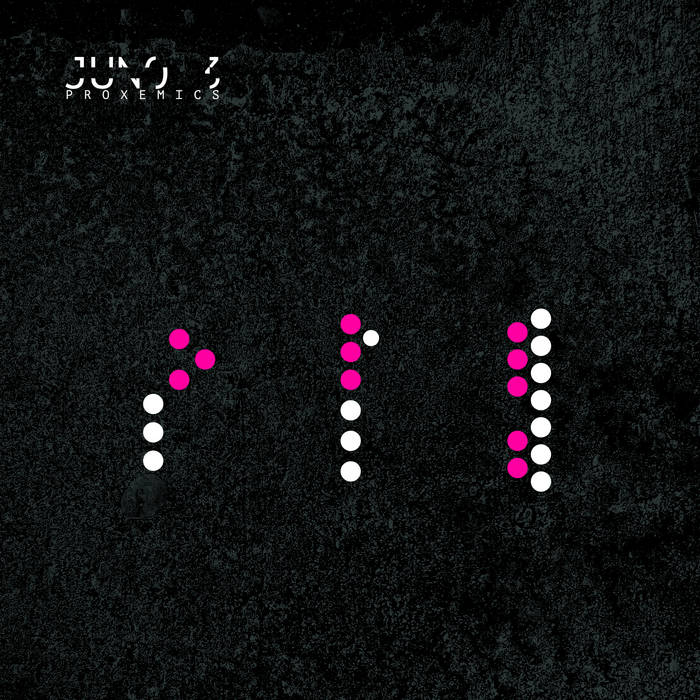In cultural anthropology, proxemics is the research of peoples’ relationship with and use of space, be it as part of nonverbal communication or other forms of interaction. The improv power trio of guitarist Han-Earl Park, saxophonist Lara Jones, and pianist Pat Thomas have thus chosen a most pertinent title for their second recorded outing. Just as we mediate social distances in daily life, the group’s aesthetic emerges from similar negotiations, individual voices exploring and battling for space, then rippling over each other in constructive interference.
If the description sounds all too cerebral, the music on Juno 3: Proxemics is anything but. Rather than falling into the comfortable flow and subsequent rut of a typical free improvisation session, the trio operate in visceral, full attack noise mode. Their instruments shape jagged, spastic figures, then let them clash and fuse with each other, resulting in a sound that is akin to a freer version of Ryoji Ikeda’s glitched-out minimalism or John Wiese’s electroacoustic drones. Recorded live during the group’s performance at London’s Cafe OTO for the EFG London Jazz Festival in November 2023, the album comes in two versions. The digital edition comprises two sets in six parts each, ‘Derealization’ and ‘Proxemics’, while the cassette release includes only an alternate mix of the second set sourced from the room microphone.
Across the six ‘Proxemics’ pieces, Thomas forgoes the piano in favour of electronics, teasing his colleagues with an arsenal of maverick effects, from alarm buzzers to crumbling, fading beats. Thanks to travel and organisational complications surrounding their performance, there is a certain tension at play here. Ultimately, this nervousness proves thrilling, surfacing and resolving itself within the negative spaces between players, often accompanied by a sense of jest.
At times, Jones responds to Thomas’s bursts of noise by overblowing her saxophone and collapsing pissed off semi-melodic lines into textural skronk. At others, they join together in scream therapy, alternately evoking the jet engines of an aeroplane taking off (‘Proxemics I’) and settling into a power electronics, harsh noise, and industrial concoction – a soundtrack for a frenzied slasher flick that would make the British Murder Boys proud (‘Proxemics VI: Rumble’).
Playing on a guitar borrowed from fellow guitarist (and clarinettist and composer) Alex Ward, Park appears somewhat subdued in the mix as he extracts an extended range of sounds from the instrument. Running over the neck of the guitar, his fingers produce an insidious chatter of chirps, slides, and wobbles – sonic architectures as alien as Thomas’s electronics. When he finally charges through Thomas and Jones’s smoking battlefield, he elevates the album to some of its most powerful moments, expressed through the unexpectedly melodious Americana licks on ‘Proxemics I’ and the metallic and unhinged, thoroughly deconstructed club lullaby of ‘Proxemics III’.
In comparison, the ‘Derealization’ pieces appear more prickly, like a pointillistic vision of noise music. Lacking the sheer volume and textural density of ‘Proxemics’, their appeal lies in mischievous individual sounds: Jones’s frog-like saxophone croaks (‘Derealization I’), Thomas’s sirening, flying artillery arcs (‘Derealization IV’), and Park’s cutting squiggles, eerie drone, and ambient-adjacent expressions (‘Derealization V’). Again true to their name – derealisation is the state of experiencing reality as something distant and fake – these cuts are liminal, teetering on the brink of existence.
Writing about the album on his website, Park describes it as “unapologetically unrefined”, “probably unreleasable”, and “delicate as a slab of granite”. All of these statements ring true in the best possible way. For once, this is non-idiomatic music worthy of being called such, only loosely tethered to traditions and so confounding and strange that simply listening to it makes you feel alive. A digestif for all the palatable slop we’re usually fed.


